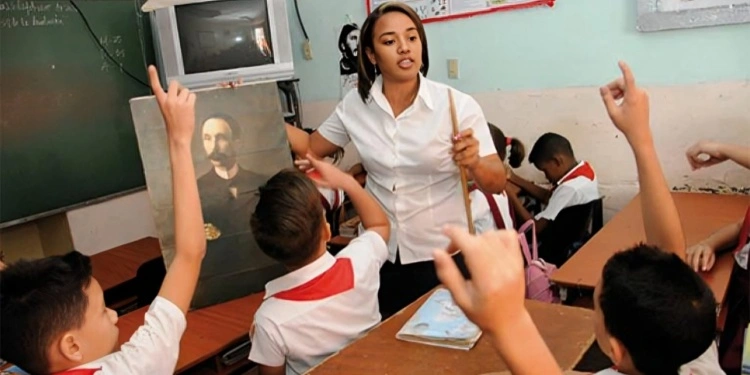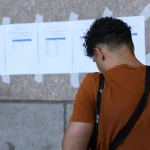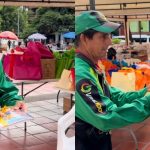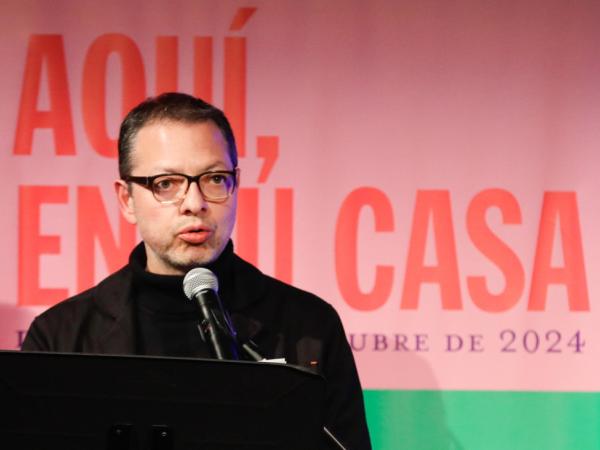PUERTO PADRE, Cuba.- Bestiario was a gladiator, the man whose job or punishment was to fight with wild beasts in the Roman circuses. And bestiario in the Middle Ages was the collection of animal fables. Bestiario is the bestial human being, that is, cruel, inhuman, perverse, insensitive, brutal in his interpersonal relationships, even with his loved ones among his loved ones. Then, it is not idle to ask: After a little more than half a century The Cuban nation has degenerated in a bestiary village…? And if so… Why…?
With different deficiencies, of human and material resources, but above all spiritual, moral and civic, all arising from malicious action or inaction of both perpetrators and victims, this Monday began the school year number 63, Yes, 63, under the monopoly of state education in Cuba. And by “state education” we mean doctrinal.
So those complaints from parents and teachers or the speeches of communist commissars, sometimes saying, “let’s go for more” – will it be for more? miseries?- remind us of the old adage that says “he who sows the wind, shall reap the whirlwind.”
66 years ago…
It turns out that in September 1958, when in Cuba we had a population of about six million inhabitants and a cattle herd of about six million heads of cattle, the primary school year began with an enrollment of 762,058 students, of which 642,058 began or continued primary education in the schools public schools, while 120,000 did so in private schools.
And even though it wasn’t enough Given the many difficulties to be solved in a Republic that at that time was barely fifty years old, the budget of the Ministry of Education in 1958 was 74,177,080 Cuban pesos of yesteryear, equivalent to US dollars, which at today’s official exchange rate and only 25 Cuban pesos devalued per US dollar, would be something like… 1,854,427,000.
But that was 66 years ago, and when a significant part of Cuban schools – and more important for their teaching quality than for their quantity – did not depend on the budget of the State because as private institutions they financed themselves.
State financing
And that’s how it worked teaching In Cuba, from primary schools to universities: public, financed by the State at the expense of taxpayers; and private, financed by individuals, unions, commercial, religious or other institutions.
And it can be said that, even though it was not perfect – a rare human condition – the public and private education system was efficient, judging by the high standards of the professionals it trained, but above all, by the civic, moral, hard-working and honest values that the teaching profession on the Island inspired in its disciples, which, with few exceptions, whether in the political, military, police, business or marginal class, led Cubans in their country or wandering around the world to behave with honesty and dignity, even while suffering extreme poverty.
The storms…
But on June 6, 1961 – 63 years had just passed – the Castro regime, still totalitarian in the making, promulgated the “Law of Nationalization of the teaching”, alleging that in “many private educational centers” and especially those operated by “Catholic religious orders”, their directors and teachers had been carrying out “active counterrevolutionary propaganda work”, according to the law, with “great harm to the intellectual, moral and political formation of children and adolescents”.
And, with such a government verdict on the schools private schools and their teaching and management staff, criminalizing them as “counterrevolutionaries”, the “Law of Nationalization of Education” was enacted on June 6, 1961, which in Article 2 wrote: “The nationalization is hereby ordered and consequently the award to the Cuban State of all educational centers that, at the time of the enactment of this Law, are operated by private individuals or legal entities, as well as all the assets, rights and shares that make up the assets of the aforementioned centers.”
Needless to say, by the time the school year began in September 1961, there were no longer any private schools in Cuba because, according to the then Prime Minister Fidel Castro and his followers and profiteers, private education was “greatly detrimental to the intellectual, moral and political formation of children and adolescents,” when in reality, it was quite the opposite: Cuban private schools, from the humblest, those that operated in family homes, to the most exalted in Havana or the provincial capitals, were centers of intellectual, moral and civic development for children, adolescence and youth, channeling pluralistic political thinking.
The teaching system
And it was for that very reason, that private schools were entities for the formation of free thought, which made them enemies of a regime that had proposed not only the administration of the State, but also the political control of the entire societywhich entailed the reductionism of history, starting from the same concept of Republic, branding the period from May 20, 1902 to January 31, 1958 as a “mediated republic”, in order to glorify with the pompous name of “Revolution”, the long years of ordeal that have been for Cubans since January 1, 1959 until today.
But this rewriting of history was not possible with a mixed system of public and private education, where, although following national study objectives, each school and even each teacher had a methodology and a very personal leadership that influenced students in a particular way, whether in a primary school or in a higher education department. And this led to the totalitarian regime, still in its infancy but with well-defined tyrannical purposes, not only expropriating private schools, but also annulling university degrees obtained in them.
It will take years of historical, sociological and legal research to fully clarify the damage done to the Cuban nation by the castration of its emancipatory, civilized education system, which was not born with the Republic on May 20, 1902, but dates back to the era of Spanish colonialism, when the founding fathers – Céspedes, Agramonte and Martí, to name just three great men – enjoyed the educational freedoms that Castro-Communism has denied Cubans for more than half a century.
Answering the questions posed at the beginning, certainly, without education but dogmatized by a communist, beastly totalitarian State, in the last half century, the Cuban nation has degenerated from the cultured and hardworking people that we were to the bunch of cruel, inhuman, perverse, insensitive and brutal people that we are and reflect our uncivil behavior and our criminality. And this account of blood, sweat, tears, bars or diasporas has a name: bestiary.

















